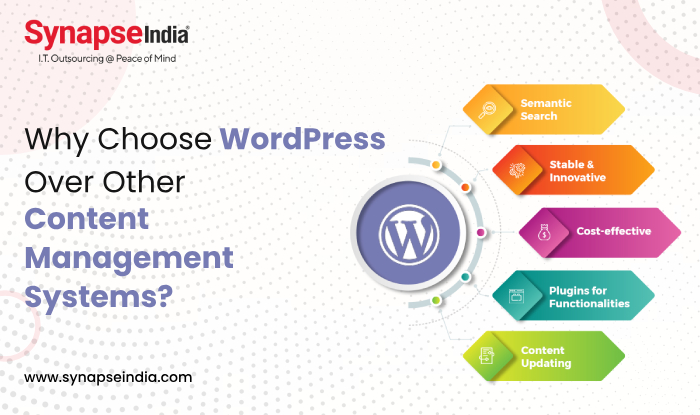 29 Jan 2024
29 Jan 2024
WordPress is one of the biggest open-source content management systems (CMS), mainly used for content-driven websites like blogs. WordPress is not a native e-commerce platform for online business. WooCommerce is a WordPress CMS plugin that makes it a more powerful and easy solution for creating e-commerce websites. There are more than 80 million active websites of WordPress with more than 70 million posts created monthly. While discussing WordPress vs any other CMS platforms, we should remember that each has its features. Let’s discover more about WordPress CMS and what makes it a suitable option for creating an e-commerce website.

WordPress CMS is a versatile content management system (CMS) that offers a wide range of features to help users create, manage, and customize websites. Here are potential features of WordPress development:
Intuitive dashboard and user interface for easy content management.
Extensive library of themes for website design customization.
Robust ecosystem of plugins to add functionality and features
WYSIWYG editor for easy content creation and formatting
Built-in media library to manage images, videos, and other media
SEO tools and plugins to optimize content for search engines
WordPress is a versatile content management system (CMS) that is extensively used across various industries and for diverse purposes. Here are common uses of WordPress:
WordPress originated as a blogging platform and remains widely used for personal and professional blogs.
Many small and large businesses use WordPress to create and manage their official websites.
WordPress integrates seamlessly with WooCommerce and other plugins, making it popular for creating online stores.
Artists, photographers, designers, and other creatives use WordPress to showcase their portfolios.
WordPress's flexibility is leveraged by numerous news outlets and online magazines for content management.
Educational institutions use WordPress to create websites for schools, colleges, and universities.
Here is a detailed comparison of WordPress vs Joomla vs Drupal platforms that will help you choose the desired one:
| Feature | WordPress | Joomla | Drupal |
|---|---|---|---|
| Ease of Use | Extremely user-friendly, easy for beginners | User-friendly but may have a steeper learning curve | A steeper learning curve, more complex for beginners |
| Customization | Vast ecosystem of themes and plugins for easy customization | Offers extensions but not as extensive as WordPress | Highly customizable but may require more technical expertise |
| Community Support | Largest and most active community, with extensive resources | Active community but smaller than WordPress | Strong community support, but not as large as WordPress |
| SEO Capabilities | Excellent SEO plugins and tools | Good SEO capabilities, but not as extensive as WordPress | Strong SEO capabilities, similar to WordPress |
| Content Management | Outstanding for content-focused websites | Effective for content management but less intuitive than WP | Robust content management system, suitable for complex sites |
| Plugins and Extensions | Extensive library of plugins for various functionalities | Offers extensions, but the selection is not as extensive | A variety of modules and extensions, though not as vast as WP |
| Updates and Maintenance | Regular updates with a focus on user experience | Regular updates, but users may need to be more hands-on | Regular updates with a focus on security and performance |
| Security | Strong security practices and a large community of vigilance | Good security practices but not as widely recognized | Emphasizes security, with a reputation for a robust framework |
| Learning Curve | Low learning curve, suitable for beginners | A moderate learning curve may require more time to master | Higher learning curve, better suited for experienced users |
| Cost | Open-source and free-to-use | Open-source and free, but some extensions may have costs | Open-source, but development and maintenance costs may vary |

Choosing the right WordPress development services is crucial for the success of your website. Here are key considerations to help you make an informed decision:
Clearly define your website goals, whether it's blogging, e-commerce, portfolio showcasing, or other purposes.
Determine your budget for website development, including design, hosting, and ongoing maintenance.
Identify specific features and functionalities your website requires, such as e-commerce, memberships, or advanced SEO.
Check the experience and expertise of WordPress service providers. Look at their portfolio and client testimonials.
Ensure that the service provider offers customization options tailored to your design and functionality preferences.
Verify that the WordPress services include the development of a responsive design for optimal viewing on various devices.
Consider the SEO capabilities of the services, including the integration of SEO plugins and optimization practices.
The best WordPress plugins and extensions can enhance your website's functionality, security, and overall performance. Here are some highly regarded plugins and extensions across different categories:
Optimize your website for search engines with features like content analysis, XML sitemaps, and meta tags.
Transform your WordPress site into a powerful e-commerce platform with features for product management, payments, and more.
A popular drag-and-drop page builder that allows you to create visually stunning pages without coding.
Protect your website from spam by automatically filtering out comments and contact form submissions.
A multipurpose plugin with features for performance optimization, security, site management, and more.
Back up your WordPress site easily and restore it in case of emergencies.
Integrate Google Analytics seamlessly into your WordPress site to track user interactions and gather insights.
Choosing WordPress CMS or any other CMS platform is an important decision that depends on various factors, each platform offering its unique strengths. WordPress, with its WooCommerce integration , stand out for its user-friendly interface, extensive customization options, and vast ecosystem of plugins. WordPress CMS remains a versatile and powerful solution, but careful consideration of your goals and preferences will guide you toward the CMS platform that best suits your needs and aspirations.

